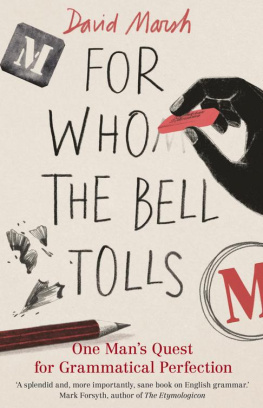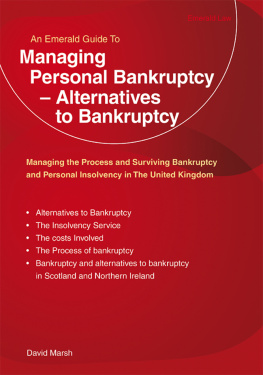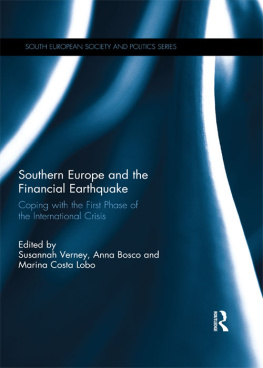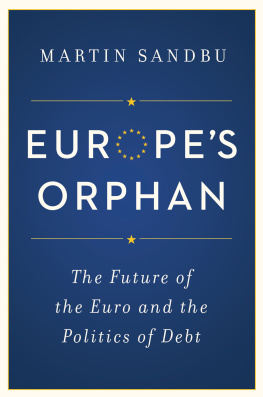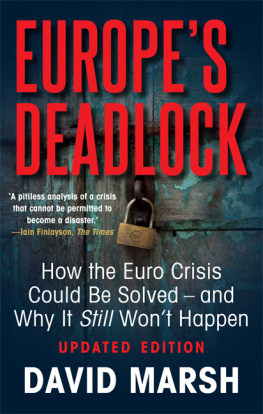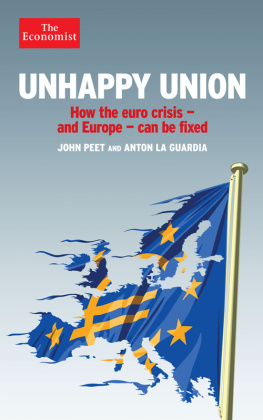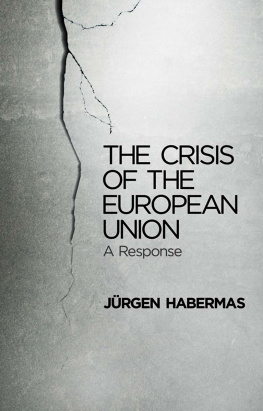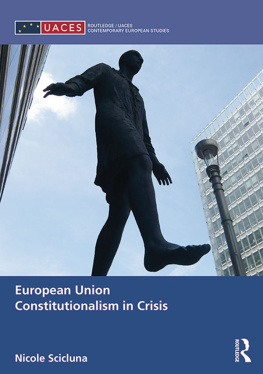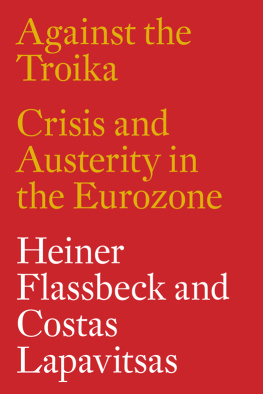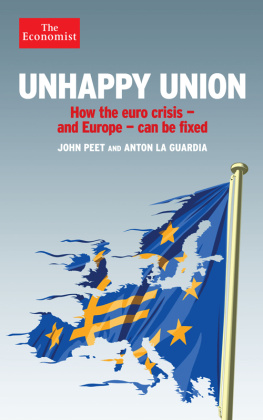Marsh exposes the basic problem of the euro: no ones in charge. Monetary union was a colossally risky experiment launched without adequate crisis management precautions and without centralised political oversight. Unlike the other countries, Britain properly analysed the risks and decided, rightly, to stay out. Its a pity that other Europeans didnt show similar caution.
Lord (John) McFall, member of House of Lords Economic Affairs committee, former chairman, House of Commons Treasury Committee
An admirably lucid analysis. Marsh weaves together the politics as well as the economics of the euro. In Europe (very properly) politics is about democracy. If the euro area is to become more integrated, as it must in order to survive, then the democratic deficit, which is already bad enough, would become intolerable. This is a hugely important issue.
Lord (Nigel) Lawson, former Chancellor of the Exchequer
David Marsh has once again placed his finger on the gaping wounds that continue to afflict the European Monetary Union. While not everyone will agree with his conclusions and a great many more will hope that he is wrong he has built a cogent case for being very worried about the future of the single currency.
Prof. Michael Burda, School of Business and Economics, Humboldt University of Berlin
Europe is brilliantly right because it has achieved zero prospect of war, an achievement no other region can match. Yet its also brilliantly wrong because it has tried to achieve an impossible dream: monetary union without fiscal union. Marsh explains well the European mess and even suggests a solution. His book is a must read for European policy-makers. Even Asians may learn a lesson or two.
Prof. Kishore Mahbubani, Dean, Lee Kuan Yew School of Public Policy, National University of Singapore
A brilliant and incisive analysis of the intractable practical and political problems facing the euro and why the hopes of its founders have been disappointed.
Lord (Christopher) Tugendhat, chairman, House of Lords EU External Affairs committee, former European Commissioner
The fate of the euro area is the most momentous public issue of our times and there is no better guide than this gripping, well-informed study by the leading expert on its genesis and development.
Prof. William Paterson, Honorary Professor of German and European Politics, Aston Centre for Europe, University of Aston
This book deserves wide discussion among harried and frustrated policy-makers. I am happy that Marsh has taken up the challenge of discussing a plan to make the euro survive for the longer term. Even though he exaggerates some of the difficulties, this book will have an important impact.
Prof. Niels Thygesen, Emeritus Professor of Economics, University of Copenhagen, member of the Delors Committee on Monetary Union
This precise, elegant, and humorous depiction of Germanys unique role in the euro drama brings the reader to the central argument: without political union, monetary union is left weak or even unviable. A single central bank needs a single political counterparty. Marsh argues that the euro crisis will linger to the point of becoming chronic but rejects the notion of a rapid, dramatic disintegration. It is difficult to imagine a pathway back to national currencies that would not entail even greater catastrophe.
Prof. Maria Antonieta Del Tedesco Lins, Professor of International Relations, University of So Paulo
A lucid and well-informed, if somewhat German-centric, account of the development of the euro crisis, in which Marsh explains, with admirable clarity, why the crisis has been so difficult to resolve. Although he charts a way out, he makes clear his scepticism that Europes leaders can deliver on their many promises to reform.
Even if he is only half right, pro-Europeans should heed his analysis and warnings, and ask themselves whether the governance changes adopted to date go far enough.
Prof. Iain Begg, European Institute, London School of Economics and Political Science
This book is right to question how the EU can sort out the economic and social mess created by the euro. It is a case of having a bank account with the neighbours before they have worked out who pays all the bills. David Marsh tries to pilot a way through these troubles.
John Redwood MP, Chairman, Conservative Party Economic Policy Committee
An excellent analysis of the crisis in the euro area. The comprehensive diagnosis of the causes of the crisis is accompanied by a sobering prognosis regarding the prospects for its resolution anytime soon.
Prof. Simon Bulmer, Professor of European Politics, University of Sheffield
EUROPES DEADLOCK
D AVID M ARSH is Europes foremost chronicler of post-war monetary affairs. Chairman and co-founder of the Official Monetary and Financial Institutions Forum (OMFIF), he wrote for the Financial Times between 1978 and 1995, including in France and Germany, becoming European editor, and subsequently worked in City financial institutions. He is the author of four acclaimed books on European politics and money, including The Euro: The Battle for the New Global Currency (2009 and 2011).

Copyright 2013 David Marsh
The right of David Marsh to be identified as author of this work has been asserted by him in accordance with the Copyright, Designs and Patents Act 1988.
All rights reserved. This book may not be reproduced in whole or in part, in any form (beyond that copying permitted by Sections 107 and 108 of the U.S. Copyright Law and except by reviewers for the public press) without written permission from the publishers.
For information about this and other Yale University Press publications, please contact:
U.S. Office:
Europe Office:
Set in Arno Pro by Yale University Press
Printed in Great Britain by Hobbs the Printers Ltd, Totton, Hampshire
Library of Congress Control Number: 2013942358
ISBN 978-0-300-20120-8
A catalogue record for this book is available from the British Library.
10 9 8 7 6 5 4 3 2 1
2017 2016 2015 2014 2013
Contents
Preface
T HE GESTATION phase for this book has been miraculously and mercifully short. In March 2013 Christian Strasser of Germanys Europa Verlag persuaded me to write a short book in German to elaborate on my thesis that the euro crisis could not be resolved. I delivered a text in about six weeks, and then naturally had to write one in English. (In some ways this was more precise, more difficult and more detailed, for example with my plan for a properly federal Europe, which I dont think anyone wants to put into effect.) I would like to thank many colleagues and friends who (often unconsciously) have assisted my efforts to understand what is going on; I would like to single out Niels Thygesen, Meghnad Desai, Oscar Lewisohn and Michael Strmer for help with the text. Lauren Roberts, Edward Longhurst-Pierce and everyone else at OMFIF have as always been of great assistance in lots of ways, and my family has again shown forbearance. Thanks to Robert Baldock and Phoebe Clapham at Yale University Press for pushing this through.
David Marsh
Wimbledon, June 2013
Introduction
H ISTORY SHOWS us how periods of unstable equilibrium can last a surprisingly long time. During the First World War, the western front was frozen into the terrain for three-and-a-half years. The Cold War between the Soviet Union and the US lasted forty years. For four centuries, Greece was part of the Ottoman Empire. Consequently, we should cherish no false illusions about a quick end to the euro crisis.
Europe embarked on the experiment of monetary union in a bid for unity. An associated aim was to render Germany harmless and relatively powerless after German unification and to prevent a return to the old demons that laid waste to Europe in the first half of the twentieth century. After five years of supremely lacklustre crisis management since the world was hit by widespread financial upheavals in 200708, the European currency saga now pits the creditor countries which have built up large external payments surpluses led by Germany against the debtors from the mainly southern peripheral states.
Next page

